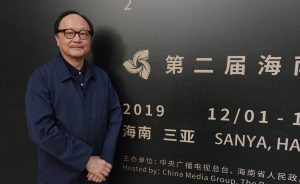US-Asia Institute Trustee and seasoned entertainment and media attorney Mr. Tom Ara, Co-Chair of DLA Piper’s Entertainment Finance and Transactions Practice, has represented diverse clients within the media and entertainment industry and provided legal advice on a multitude of transactions on a global scale. We recently sat down with Mr. Ara and gained valuable insights on the key role he plays in industry transactions between the U.S. and China, the experiences and impressions he has drawn from his many years of involvement in such transactions and the efforts he is making as a Trustee of the US-Asia Institute to try to improve social and economic relations between the U.S. and China in light of the ongoing trade disputes.
Q: You have abundant experience in legal transactions within the entertainment industry, especially in the film sector. What are your main responsibilities in these transactions?
A: The role a successful lawyer plays in the entertainment industry is unique as he or she should be both a dealmaker and legal advisor. To be an effective dealmaker, a legal education is helpful but not necessary. The skills of a top dealmaker include a deep industry knowledge and familiarity with industry transactions, an intimate understanding of your client’s business and objectives and the ability to bring the parties and elements to a transaction together to make a “deal” that is mutually beneficial for all parties involved. A mutually beneficial deal does not mean that a dealmaker has to convince a client to make big sacrifices to make the other party happy but it does require helping the client understand that both parties should leave the negotiations generally feeling that they have made a good deal. Dealmakers must be zealous yet rational advocates.
The entertainment lawyer’s role as legal advisor requires an exceptional understanding of the deal that he or she made and the applicable law and the ability to translate these elements into a clear, concise and binding agreement. One of the things I always do when reducing a deal down to a written agreement is to step back and ask “would someone who does not know anything about the deal understand what the parties intended after reading the agreement?” If the answer is “No”, then I have not effectively done my job as a legal advisor.
I act as both dealmaker and legal advisor to my various clients including financiers of various types (investors, private equity groups, hedge funds, commercial banks), domestic and international studios and production companies, distributors, producers and various other participants in the entertainment industry. I am tasked by my clients with negotiating and documenting various types of complex financing arrangements often times involving multiple parties, sophisticated joint venture and distribution arrangements and a variety of other transactions involving the financing, creation and exploitation of content. A large amount of the transactions I handle are cross-border and a majority of those have historically involved Asia, broadly speaking, and China in particular. I also regularly work on transactions involving Europe, the Middle East and Latin America.
Q: China and the U.S. have fundamentally different law systems. What are your thoughts on working in such different environments?
A: As a lawyer that is only licensed to practice in the U.S., I only provide legal advice that is U.S. law related. I am not a Chinese licensed lawyer, so I do not practice Chinese law. The agreements with respect to which I can provide legal advice are governed by U.S. law and more specifically, California law. Since many entertainment industry agreements are governed under Californian law, I am able to provide legal advice on most of those agreements but if an agreement is governed by the laws of another jurisdiction, such as China, I will work with lawyers in that jurisdiction to assist with the transaction as well. In most Hollywood transactions, parties from other jurisdictions are generally amenable to allowing California law to govern their agreements because of the established set of laws and legal precedent governing entertainment industry transactions and copyright. If there is a dispute, most parties prefer to enforce their agreements in California because they understand that in California there is a court system that is developed and has experience in adjudicating entertainment industry disputes. Furthermore, when we are talking about issues of ownership of film, television, or content in general, copyright law is implicated, and U.S. copyright law is the most established law governing copyrights in the world. With that said, some parties may insist on the applicability of foreign laws or jurisdiction, such as China, for strategic advantage.
Q: To a certain extent, you essentially witnessed the growth of the Chinese film industry from the very beginning. Do you think that entertainment law in China has developed throughout these years?
A: I am grateful to have had the benefit of being one of the very few Hollywood lawyers that was involved in dealmaking in China early on in the development of its film industry. The perspective I have gained from my longstanding involvement has been invaluable and instructive in my work in the region. I would not say that the major development in China in recent years has only been in entertainment law but rather law practice in general. Firstly, I’d say more Chinese lawyers are becoming aware and adept to the ways of the West. I remember back in the mid-2000’s when I first started traveling to China, written agreements for many Chinese deals were very brief and shorthanded and did not have the same level of importance in those deals as “Guanxi” or personal relationships. But as the number of transactions with the West started to increase in volume, and as more Western companies of varying sizes and types entered the market, parties began insisting on Western-style agreements which then led to Chinese lawyers having to learn and adapt. In the process, the experience of Chinese lawyers with entertainment industry agreements evolved as well since many of the China-U.S. transactions of the past decade or so have involved Hollywood. In recent years, many more Chinese students have also been studying in the U.S., particularly in the area of law, working at U.S. companies and returning to China with a deep understanding of U.S. law and entertainment industry practices and this is readily apparent, particularly in dealings I have had with younger Chinese lawyers on transactions I have been involved in with China. Chinese universities are also more frequently inviting guest lecturers from the West to visit and present Western curriculum (I have done so myself at Shanghai University’s Film School the past several years). All of these developments together have contributed to the evolution of the legal practices and understanding by Chinese lawyers to a more Western style of practice. Copyright and trademark protection has also strengthened in China, but I would not say that Chinese law in those areas appears to have necessarily evolved to the same extent as in the West.
Q: In terms of film financing, what are the main differences between the typical practices in the US and those of in China?
A: Western film financing structures are certainly developing in China as well but in their own way. However, film financing through commercial banks which lend against foreign presales and other contracted receivables has yet to fully develop in China. China-based banks have not traditionally lent money for film financing transactions of this type. Rather, private equity has historically been the method of choice for most Chinese studios and producers. We have seen some slowing in this form of financing as well as a result of some of the scrutiny the Chinese film industry has faced due to tax issues, the weakness of the stock markets and economy in general and capital outflow restrictions.
Q: Given Chinese government’s tightened control over capital outflow and American government’s closer scrutiny on Chinese investments, how do you think that influences film makers?
A: Three years or so ago, 16 bipartisan members from the U.S. Congress wrote a letter to the U.S. Government Accountability Office (GAO) requesting that it review the laws governing the Committee on Foreign Investment in the United States (CFIUS). The reasons for this request, among other things, included concerns about the telecommunications, media and agriculture sectors. In relation to Hollywood, the letter specifically cited Dalian Wanda Group, which owns AMC Entertainment and Legendary Entertainment. As a result, in addition to the GAO’s office undertaking its review of the CFIUS laws, just two years or so later the laws governing CFIUS were entirely overhauled by the Senate’s passage of the Foreign Investment Risk Review Modernization Act (FIRRMA). FIRRMA makes material alterations to the CFIUS landscape, including, among other things, expanding CFIUS jurisdiction, including non-controlling investments in its purview and requiring mandatory declarations for certain foreign government-controlled transactions.
There may be some legitimate concerns on the Hill on the high tech or infrastructure side of things but the concerns relating to the media and entertainment industry are viewed by some as overblown. The most significant change to CFIUS is the major expansion of its jurisdiction over transactions which used to be limited to transfer of control over a U.S. business to a foreign person but now also covers non-controlling “other investments” by a foreign person in an unaffiliated U.S. business in certain circumstances. This could mean that an investment as little as 5% in certain types of businesses could trigger CFIUS review and scrutiny.
To my knowledge, CFIUS has not specifically scrutinized any Chinese investments in films or film companies but that could be because the volume and scale of those types of investments has significantly decreased since the passage of FIRRMA so it may just be the case that the right (or wrong) transaction has not presented itself to date. Keep in mind that the ultimate decision under CFIUS to block a transaction resides with the President of the U.S.
Q: What are your thoughts on the ongoing US-China trade war and its influence on the entertainment sector? Do film producers feel an impact in their deals?
A: It is a fluid situation and although the U.S. tariffs do not appear to directly target the Chinese entertainment industry, there are often broader implications of the current situation which may have residual direct or indirect consequences on the industry. The Chinese culture sector has been a highly sensitive and regulated area in China and that long preceded the trade war, and entertainment investments are under even greater scrutiny after China’s recent revisions to its laws and regulations, the elimination of SAPPFRT and the consolidation of decision making powers relating to the culture industries under the State Council. These changes will give the Party much closer control of the entertainment industry and ensure that any approved transactions are consistent with the values of the Party. With a trade war in the backdrop, Chinese authorities are likely to be most vigilant in enforcing the laws and regulations which govern this industry.
Q: We know that US and China are supposed to renegotiate the formal agreement on import film quota and revenue sharing policies. What’s the current state of the negotiation and what’s your prediction of the final results of the negotiation?
A: The renegotiation of the deal made in 2012 by then Vice-President Joe Biden with then Vice-President Xi Jinping seems to be stalled due to the broader trade war. The United States Trade Representative Robert Lightzinger is responsible for this renegotiation on behalf of the various entertainment industry trade associations, among the other industries he is negotiating on behalf of, but Lightzinger has had his hands full as you can imagine with all that has been happening. It would seem that the major Hollywood studios would be most interested in increasing a share of the China box office revenue (which currently sits around 25% for most films) they receive for their films rather than increasing the number of revenue share films allowed into China (which the major studios currently dominate), whereas the independent film sector wants additional slots for revenue share films to be allowed in as most of the current revenue share films entering China are major Hollywood studio tentpoles.
Q: I remember in December last year additional imported films were let in. That means the actual number of imported films exceeded 34.
A: The number of revenue share films permitted into China is subject to change by the Chinese authorities overseeing the film industry and, as the authorities will often say, there is no hard and fast quota. The Chinese authorities and the broader government are looking for a balance in the film industry in China between Chinese films and non-Chinese films, while ensuring that there is sustainable growth year-on-year. If non-Chinese films allowed into China throughout the year do not perform as expected and the Chinese box office does not meet expectations, additional films will be permitted to come in. The number of theatrical screens has significantly increased in China in the past decade and surpassed the U.S. so the revenue must keep up to maintain that infrastructure and sustain further growth.
Q: I have a question regarding insurance in the film industry, particularly completion bonds, as they have been a hot topic these past years in China. People are debating on whether it is applicable in China. Do you think such practices can be implemented in China?
A: First off, let’s clear up a great deal of confusion that exists in the Chinese market when discussing film insurance vs. a completion guaranty. Film insurance and a completion guaranty are two very different things. Film insurance typically protects the production from various risks associated with production, such as damage to sets and film elements, delays due to natural causes, etc. A completion guaranty may look and seem like insurance (and the obligations of the guarantor are often backed by an insurer), but the purpose of the completion guaranty is limited to protecting the financier of the film by ensuring that the film is completed on time and on budget and that the finished film is delivered to the distributors. The completion guarantor requires a number of things to occur in order to provide a completion guaranty. It has to make sure that at the time a film goes into production the producer has available to it monies covering the entire budget of the film (i.e. the money required to make the film) because the completion guarantor is not in the business of ensuring that financiers fund their share of the budget. If the money is coming from a private investor, that money would typically be placed in a bank account the completion guarantor has access to and control over. Though not pervasive, there are a few companies in China that are providing or are looking to provide such services. It is a challenging business to manage in China, however, as one of the things the completion guarantor has to do is keep a close account on how the money is being spent to keep on budget, and it may prove harder to do so in China due to the various payment methods used in China.
The most important thing to understand about both film insurance and a completion guaranty is that neither of these products ensure that a film will be financially successful or that an investor will receive its money back after the film is released.
Q: Can you tell us more about the US-Asia Institute and your role within it?
A: Sure—For the past five years I have had the privilege of serving as one of the few Trustees on the Board of Trustees of the Washington, DC-based US-Asia Institute. The Institute is a non-political, non-partisan, non-lobbying, non-profit organization devoted to improving understanding and strengthening ties between the people and governments of the U.S. and Asia. This year is the Institute’s 40th anniversary. The organization was founded in 1979 by influential politicians and business people from the U.S. and Asia, with the support of President Jimmy Carter. In the United States, the Institute has built strong ties with the White House, Congress and other governmental agencies, nongovernmental organizations, and the business community and, in China, with the National People’s Congress and other governmental agencies and nongovernmental organizations.
One of the important things the Institute is involved in is planning and hosting congressional delegations to Asia. These trips offer significant benefits to congressional members and their staff, allowing them to gain firsthand experiences in Asian countries, listen to the ideas of their counterparts and share their views, clarify misconceptions on Asia, and be exposed to the cultural and historical aspects of Asia. A large number of our elected representatives in the U.S. have not visited the region, and particularly China, which at this time is the most important economic and political force in the region. Some of the individuals which the Institute invites on these delegation trips are congressional members and their staff who sit on foreign affairs committees and are responsible for legislation and policy that affects a region that they may only know about through reading briefings and reports prepared by others.
Over the past decade or so the Institute’s focus has shifted heavily to China because of its continued rise to power and so most of the delegation trips (over 140 to date) travel to China. These trips are conducted under the U.S. Mutual Education and Cultural Exchange Act and the cost is fully paid by our host countries and no U.S. taxpayer dollars are used to pay for any of the trips. In China, an arm of the National People’s Congress called the Chinese People’s Institute of Foreign Affairs typically acts as our host and arranges key meetings with elected officials and ministries, among other things. During these delegation trips, much of what occurs is discussion about socioeconomic and cultural issues to understand different points of views. The delegates also have the opportunity to visit with local businesses, both Chinese and American, to see how they are thriving or struggling in the host country.
I have had the privilege of accompanying several of these delegations’ trips to China and recently accompanying a congressional trip with some focus on the entertainment industry. I have found that the delegates that travel on these trips return, especially those who have never traveled abroad or to the region, with their eyes wide open and much more informed and educated about the region. We hope that some of what they see and hear will be valuable to their policy-making back at home, not necessarily in a positive or negative way but simply from the perspective of mutual understanding. With the Institute turning 40 this year, I could not think of a more important time for the Institute to play the role it has historically in helping advance positive relations between the U.S. and China. I hope to be able to play at least a small role in these efforts in my capacity as a Trustee of the Institute.






